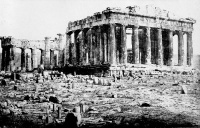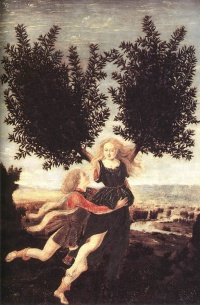Classics
From The Art and Popular Culture Encyclopedia
|
"It seems an anomalous thing that any university student should proceed to his doctorate in Greek and Latin without ever having had a conspectus of the entire field of which he is familiar with a part; that, for example, he should be able to give no intelligent account of the Alexandrian School; that the significance of the Renaissance to a classicist should not be clear to him; that Scaliger, Lipsius, Casaubon, Bentley, Corssen and Lachmann should be little more than names; and that he should have learned nothing genetically about literary criticism, text criticism, and scientific linguistics."--A History of Classical Philology (1911) by Harry Thurston Peck "There are not four men in Latin Christendom who are acquainted with the Greek, Hebrew, and Arabic grammars."--Roger Bacon cited in A History of Classical Scholarship by John Sandys |

|
Related e |
|
Featured: |
Classics or classical studies is the study of classical antiquity. In the Western world, classics traditionally refers to the study of Classical Greek and Roman literature and their related original languages, Ancient Greek and Latin. Classics also includes Greco-Roman philosophy, history, archaeology, anthropology, art, mythology and society as secondary subjects.
In Western civilization, the study of the Greek and Roman classics was traditionally considered to be the foundation of the humanities and has traditionally been the cornerstone of a typical elite European education.
Etymology
The word classics is derived from the Latin adjective classicus, meaning "belonging to the highest class of citizens." The word was originally used to describe the members of the Patricians, the highest class in ancient Rome. For example, Aulus Gellius, in his Attic Nights, contrasts "classicus" and "proletarius" writers.By the 2nd century AD the word was used in literary criticism to describe writers of the highest quality. By the 6th century AD, the word had acquired a second meaning, referring to pupils at a school. Thus, the two modern meanings of the word, referring both to literature considered to be of the highest quality and the standard texts used as part of a curriculum, were both derived from Roman use.
Legacy of the classical world
The classical languages of the Ancient Mediterranean world influenced every European language, imparting to each a learned vocabulary of international application. Thus, Latin grew from a highly developed cultural product of the Golden and Silver eras of Latin literature to become the international lingua franca in matters diplomatic, scientific, philosophic and religious, until the 17th century. Long before this, Latin had evolved into the Romance languages and Ancient Greek into Modern Greek and its dialects. In the specialised science and technology vocabularies, the influence of Latin and Greek is notable. Ecclesiastical Latin, the Roman Catholic Church's official language, remains a living legacy of the classical world in the contemporary world.
Latin had an impact far beyond the classical world. It continued to be the pre-eminent language for serious writings in Europe long after the fall of the Roman empire. The modern Romance languages (French, Italian, Portuguese, Romanian, Spanish, Galician, Catalan) all derive from Latin. Latin is still seen as a foundational aspect of European culture.
The legacy of the classical world is not confined to the influence of classical languages. The Roman empire was taken as a model by later European empires, such as the Spanish and British empires. Classical art has been taken as a model in later periods – medieval Romanesque architecture and Enlightenment-era neoclassical literature were both influenced by classical models, to take but two examples, while James Joyce's Ulysses is one of the most influential works of twentieth-century literature.
See also
- Class
- Classic
- Classic book
- Classical antiquity
- Classic
- Classical
- Classical music
- Classical mythology
- Classical mythology in culture
- Classicism
- Classification
- Classy
- Cult classic
- Great Books of the Western World
- Humanism
- Literae Humaniores
- Loeb Classical Library
- Neoclassicism
- Philology
- Western culture
- Western world



